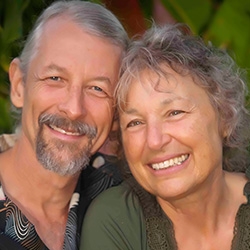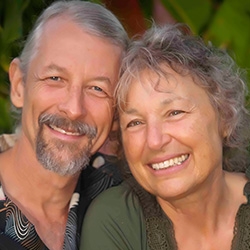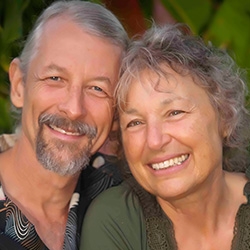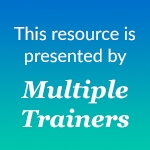

Search Results: practice
-
In this recorded telecourse, John Kinyon, world renowned CNVC Certified Trainer, offers an overview and practice with four elements of empathy – presence, understanding/meaning, need language and deepening into needs.
-
This exercise explains four stages of the "Need Cycle": Fulfilled, Emerging, Urgent, Satisfying. It asks us to consider, connect and identify needs, feelings and where we are in the Need Cycle. Then it prompts us to remain mindful of the need for sustenance as we move through the cycle, noticing the subtle shifts in your physical sensations and emotions.
-
Join Susan Skye in this hour-long audio recording to learn how to experience the NVC consciousness as an embodied, living practice of the 'Living Energy of Needs." This recording includes a supportive learning exercise and tips for expressing needs in a non-mechanical way.
"Over the years, I have noticed that people -- including trainers and facilitators -- use the words of the NVC process without full connection to life energy, often resulting in a failure to get to a full connection with actual life energy of these qualities that we have named "needs." This results in a mechanical communication model, rather than a true empathic connection. Join me in learning how to share NVC as an embodied, living practice of the 'Living Energy of Needs."
—Susan Skye -
Inspired by a talk given by Marshall Rosenberg, Jim offers an interactive exploration of powerful strategies for making NVC an integral part of your everyday life.
-
Ask the Trainer: Is a confidentiality agreement typically used in NVC practice groups?
-
The more we practice NVC by “rote” --going through OFNR (“Observations, Feelings, Needs, Requests”) on automatic-- the more likely our NVC practice would lead to disconnection. The purpose of our NVC practice is to use this NVC "map" (OFNR) to support us in integrating the consciousness of the NVC (eg. operating with the intention to connect, collaborate, etc). Once we let the map drop away, we can engage with the people in our lives in a more heartfelt way. This article explains more about how we can use the map to remind us of our heartfelt consciousness...
-
Jori and Jim Manske offer writing practices to help us become more firmly grounded in the authorship of our lives. That grounding helps us share ourselves with others more authentically and vulnerably(scary honesty)
-
CNVC Certified Trainers Jim and Jori Manske show you how to tune into the "Gratitude Channel," sharing exercises and practices to hone your awareness toward gratitude.
-
Jim Manske offers practices to stay in dialogue without defensiveness, especially when it's difficult. Listen to Jim discuss the refining of our commitment to connection and how to respond to others' defensiveness too.
-
The awareness and practice of interdependence is integral to holding an NVC consciousness. Practicing interdependence also means bringing in a quality of care in the moments we want to change agreements with others. This article talks about where our various choices, in regards to changing agreements, fits into different levels of engaging our interdependence.
-
Have you ever noticed how being heard in a deep, empathic way is like magic?
When we're deeply heard, our whole bodies relax. We return to equilibrium, we can breathe again, and access renewed curiosity, empowerment and choice. We also get a fresh perspective and new insights: like a fog lifting, we see ideas and solutions that evaded us before. And with that restored vision, we're able to find new ways to engage with others that, just moments earlier, seemed impossible or a chore.
You can become an empathy wizard—with anyone, in any situation, including the most challenging!
Join Dian Killian to explore key concepts and practices, including new ways of seeing and practicing NVC, and learn all this through direct experience, via exercises, pair work, and role play.
-
What is it that enables us to thrive? How can we influence our capacity to live a meaningful and fulfilling life? Join Jim and Jori Manske in this exciting telecourse recording on the intersection of NVC and cutting-edge Positive Psychology, the science of human thriving.
-
Self-compassion is essential for healing trauma and restoring your wholeness. It is also an antidote to reactivity and separation, allowing presence to emerge.
In developing presence, you can become what the world needs most in these times of intensity and chaos. This work can strengthen your skills to be more fully in relationship with all that life offers while allowing your heart to be moved by what is alive in you and with others
-
- Gain a deeper insight into the spiritual practice of NVC as taught by Robert Gonzales
- Enhance your emotional intelligence and self-compassion
- Learn compassionate self-talk techniques and cultivate more inner peace
- Approach change with a peaceful mindset, rather than anxiety and fear
-
Inspired by Marshall Rosenberg's teachings, Kathleen Macferran's self-empathy exercise offers a transformative approach for those challenging moments when you fall short of your own expectations.
-
- 3 full-length courses to deepen your empathy practice
- Learn your body’s “language” and how to listen deeply to it
- Quickly reconnect and return to empathic presence when you are triggered
- Enhance your listening skills and experience greater ease and joy in all your interactions
-
Jim Manske shares a four-step self-empathy practice that ends with a focus on gratitude.
-
Poetic License is a fun group exercise that's sure to incite laughter in your NVC group!
-
In this telecourse recording, you will learn and practice self-awareness skills to fine tune your attention to met needs; savoring feelings of well-being; expressing these feelings to others; and receiving other people's messages of joy, gratitude, inspiration and more!
-
Join Jim Manske for practice exercises that will help you navigate away from reactivity toward a more compassionate way of being in the world, and learn to express vulnerable honesty (scary honesty)

Quick Links
Subscription Preferences
Stay In Touch!
Looking for ways to keep up with NVC Academy news, get special offers, free resources, or words of inspiration? Here are five ways to stay engaged:
















